- Home
- Norman Mailer
The Fight Page 12
The Fight Read online
Page 12
Drew eventually came back. He was alternately surly and meek with his wife. He was preoccupied. He asked about Ali’s mood, and they talked about that for a while since Norman had spent the afternoon with Ali at Nsele. It had been a curious Sunday. Ali’s voice had left him. Whether it was the cold that appeared to be coming on the night they ran or simple laryngitis from talking too much, Ali could offer no more than a hoarse whisper, a frightening prospect for the fight if his voice was the measure of his strength. But he certainly seemed happy enough. At twilight, he took a walk on the banks of the river, and was surrounded by hundreds of Zairois men, women, and children. He kissed babies and had his picture taken with numbers of black and jubilant housewives in African Sunday dress, and with shy adolescent girls, and little boys who glared at the camera with machismo equal to the significance of these historic events. All the while Ali kissed babies with deliberation, slowly, savoring their skin, as if he could divine which infants would grow up healthy. He was one politician who would love kissing babies.
Back inside the villa with friends and family for company, he kept speaking in a strained small tone. “Don’t talk too much,” Pat Patterson kept telling him. “Rest your voice.”
Ali shrugged. “Oh, I got to talk,” he said. “I’d die if I couldn’t talk. But I’ll be careful not to say too much.”
He began watching TV cassettes of Foreman’s fights. It was a curious half hour of early evening. Mrs. Clay was there, and she was a plump and very handsome woman with a light skin, a Southern lady, just about, indeed, she looked like a matronly version of Julie Eisenhower, or more properly, let us say we can see the way Julie Eisenhower may look when she is the age of Ali’s mother. Now as Ali watched the Frazier-Foreman fight, his mother sat on the other side of the living room and watched with him. Once more, George appeared in his red trunks and proceeded to demolish Frazier, once more the sledgehammering punches went bouncing off Frazier’s brain. Again came the sight of Frazier’s face as he got up in the first round looking like a man on whom a wall has just fallen. He is back on his feet but the sky is shocking in its tilt.
As Frazier went down for the third time and Foreman, in his red trunks, stepped away, Mrs. Clay said, “That’s going to be Ali in the red trunks.”
Ali watched the films in an odd good mood as if there were something he saw that he would certainly use two nights from now. The fight with José Roman in Tokyo was shown next, a fight in which Roman threw a total of six punches before Foreman threw one. None of Roman’s punches reached Foreman. Foreman then threw twenty-four punches to Roman’s three. More than half of Foreman’s punches landed. He smashed through Roman’s arms to reach his body. Roman, lying on the floor, had the glitter of a dying animal in his eye. Then a cassette of the Foreman-Norton fight. In all, Ali watched three fights with Foreman, a total of five rounds and twelve knockdowns. He looked pleased. Something he had seen. Something he could use. Who could know what it was? Each time Foreman knocked a man out, frustration showed on his face. Foreman looked like he still wanted to kill them.
Bundini, having listened to Norman’s account, now nodded somberly, and said across the table, “Jesus has no fear.”
“Do you mean Allah has no fear?”
“I call Allah Jesus. It all comes out of God. Whatever you call Him. My man is right there with Jesus, Allah, Jehovah. He’s got it all.”
Slowly, the motive for Bundini’s invitation to dinner emerged. He wanted Norman to look at his scripts and advise him.
“But I thought you can’t read or write.”
“I can’t. But I can talk. People took down my words. I want you to take down some of my words.”
“Drew — why don’t you learn to write? You can do it. It’s time.”
Bundini looked serious and very sad. “I’m afraid to,” he said. “I learned what I learned not knowing how to read, not knowing how to write. My strength is in the same place as Samson’s hair. Reading and writing is Delilah to me. I don’t want to lose the magic God alone gave me. I got to fight for my boy,” he said. “He’s in there to fight. I got to be there too.” He offered one fine confidence. “I’m sharpening the spike. I’m going to give Foreman’s people the needle tonight.”
“How do you do that?”
“Oh, I’m going up to them to put some money on Ali. But I won’t ask for 3 to 1. I’m going to give two thousand dollars against their three. That got to worry them. They be wondering where I get the confidence. It go right back to George Foreman.”
“You have a real two thousand dollars?”
“Better be real!”
They laughed.
And so in the middle of the same lobby where Bundini had been outshouted by Elmo Henderson on Sunday morning, Bundini returned to joust on Sunday night. Elmo was not about. For certain, Bundini must have picked a time when Elmo was not about.
Having attracted some of Foreman’s people, the sparring partner Stan Ward among them, Bundini began to jeer. “I don’t want 3 to 1, I don’t need 3 to 1. My man is 3 to 1.”
“Then give us 3 to 1,” said Stan Ward.
“I would. If God was here, I would. But He ain’t. He don’t associate with flunkies who work for George Foreman, that big man, that big white man. I don’t give you 3 to 1 because I don’t give no advantage to people who work for the White Man.”
“Then why you asking 3 to 2 instead of 3 to 1,” someone said suspiciously.
“Because you the bullies. Anybody works for the White Man is a bully. A bully needs advantage. I’m giving you advantage. You go out in the casinos and try to get your bet. You have to lay three to get one. You people are too fucking scared to do that. ’Cause you know the White Man upstairs. You know his faults. You know you going to lose.”
“Foreman ain’t going to lose,” said Stan Ward.
“Give me your bet,” said Bundini.
“How much you laying?”
“My two thousand dollars is in my hands,” said Bundini pulling out a roll. “Now show me, nigger, where your three thousand dollars is.”
“I can’t get it right away,” said Ward. “But I’ll have it in the morning. I’ll meet you here at eleven in the morning.”
“Yeah, if the White Man tells you to go ahead and pee, then you can piss,” said Bundini.
“He ain’t the White Man.”
“Shit, he ain’t. There he is in the Olympics, a big fat fool dancing around with an eentsy American flag in his big dumb fist. He don’t know what to do with a fist. My man does. My man got his fist in the air when he wins. Power to the People! That’s my man. Millions follow him. Who follows your man? He’s got nobody to follow him,” said Bundini, “that’s why he keeps a dog.” The followers of Foreman suddenly roared with happiness. The kuntu was audacity and they paid their respects to the spirit of audacity embodied in Bundini. “What are you ready to die for?” asked Bundini. He answered them, “Nothing. You ain’t ready for nothing. But I’m ready to die for Muhammad. I put my bread on the line. I don’t have to consult and come back here at eleven in the morning with my dick in my hand, permission to piss. I put my bread on the line. If I got no bread, I’m dead. If I got no loaves, I’m cold stone in the oven,” crooned Bundini. “That’s what it’s all about. Muhammad Ali has Bundini ready to die, and what does the White Man have? Twenty-two niggers and a dog.”
Foreman’s people roared with all the happiness of knowing that Foreman would win and that the spirit of audacity was nonetheless not dead. A very heavyset Negro with a cane for his game leg and heavy horn-rimmed glasses for his game eyes gave a peal of shrill laughter high as a spurt of water shooting up, and held out his palm.
Bundini struck it, showed his own palm, the man struck it back. Happiness. If words were blows, Bundini was champ of the kingdom of flunkies. Long live Nommo, spirit of words.
N’GOLO
10. SORCERERS
ON TUESDAY EVENING, the night of the fight (which in Kinshasa would not take place until 4 A.M. on Wednesday morning
), something like two hundred journalists were sweating in Press Headquarters at the back of the Hotel Memling. A bureaucratic room offering a dirty floor, dirty beige walls, and rows of aluminum chairs with pale orange plastic bucket seats, it was quickly characterized by the AP man, John Vinocur, as looking like the New York State Employment Office. An inadequate air-conditioning system added its clammy draft to the heat.
Once assembled, the reporters were kept waiting in the Press Room for an hour and a half. From seven in the evening to eight-thirty, two hundred members of the press jammed a room whose fire laws would have closed the door at population eighty, and in the wan light of the fluorescent tubes, reporters were crowded in on one another like a fast-growing culture in a Petri dish. Who knows the murderous remarks of bacteria? The media men talked with passion of Mobutu’s lack of faculty for public relations, yet no one dared to leave. The press representative, Tshimpumpu, had announced that he wished to speak to the press. From experience, everyone knew the speech could contain information essential for getting into the stadium, mention of some arcane gate, for example, not listed on the ticket, but crucial. Besides, it was dangerous to miss picking up one’s ticket. The rest of the night could be spent pleading with Tshimpumpu’s assistants, who would be unable to make a decision without him. God’s blood, one didn’t want to miss obtaining the ticket now.
Yet as the first half hour went by and then the second, living conditions became intolerable in that overpacked room. After a while one began to recognize there were more important goals in life than fight tickets. Self-preservation might be one of them. An hour in the Press Room of the Memling under these conditions was like a festival for cancer cells. Some boredom was escalation in its promise of future disease.
So Norman Mailer and George Plimpton took off to get a beer and, having found a table in a café across a park behind the Memling (able thereby to keep an eye on the press-room door), were able to relax sufficiently to look for the intent of this peculiar way of distributing seats. Since nothing could have been simpler than to assign an official to a room where he could pass out the tickets as each reporter came by to show his credentials — a modest and natural method used for happier fight promotions — one had here to wonder at the motive: Was it the bureaucratic lust for wanton dislocation on a collective scale, or did Tshimpumpu look to stage the works of Franz Kafka? If the first seemed the likelier explanation, the second finally proved better. For Tshimpumpu never appeared. Murray Goodman, Publicity Director representing the American and English elements of the promotion, Helmdale, Video Techniques, Don King Productions, etc., had the onus of facing the press.
Plimpton and Mailer once safe outside did not know, of course, how wise they had been to leave, but must have sensed it, for they enjoyed the beer, Primus, and the cool African air. They began to talk about Plimpton’s luck in finding a fetishist. The day before, Plimpton had mentioned that it might be interesting to visit a conjuror and buy some equivalent of a rabbit’s foot on which the sorcerer had worked a magic. “All the rich Blacks in Kinshasa are doing it with their own special medicine men,” remarked Plimpton, “and they say it’s very expensive. I wonder if you want to come in with me on it.”
“We’d buy it for Ali, of course,” Norman asked.
“Yes, that’s what I thought,” said George. His face, however, pinched just perceptibly, a Yankee pinch, that subtle tightening of expression when getting ready to put out a candle with one’s fingers. Norman thought he knew what it was. The story could look distasteful in print. They would appear silly if Ali lost, and a hint vainglorious if he won. Besides, Plimpton might wonder how Norman Mailer would handle George Plimpton in the writing.
“On second thought,” said George in his fine voice, so reminiscent of the restrained taste for zany leaps and happy improprieties that we used to hear in the voice of Cary Grant, “on second thought, maybe we just ought to ask the féticheur to work his magic for a good fight.”
“I guess that’s reasonable,” Mailer said reluctantly.
“I think it is,” George said.
But now, sitting in the café, he reported a lack of success. The féticheur had wanted too much money. “I think what drove the price up,” Plimpton confessed, “was his consternation at the demand not to curse one fighter, but give uplift to both. It would have used too much of his stuff.”
Later that night, their tickets having put them down side by side in the same press row, Mailer nudged Plimpton right after the huge excitement of the first round. “If we had bought a good fight,” he said, “we’d be taking credit now.”
That was later. In the beer garden, they had begun to fill in one another on a few stories. There was a studied economy among journalists. To near or equal colleagues, they were willing to give up some large part of their material. If two reporters had the same deadline, they might offer each other nothing (unless it was a question of one losing a job, and even then!) but magazine writers had more time, and ways to live with the same story in separate styles. Often they would give just about all of a good observation away on the knowledge they would get another back. No one was more scrupulous in this regard than Plimpton, and he never failed to provide verbal accounting of an event in his best narrative style so that the work of literature was performed — the story existed for you as he spoke. You could almost live with it as your own perception. And when he did not have a story to offer in return, he might come up with an inspiration to adjust the balance, as he would for instance propose tonight that they travel out together to Nsele and visit Ali just before the fight, an outing which would yet bring them both into Muhammad’s dressing room in the thirty minutes before Ali put on his robe and went out to the ring.
On the other hand, you had to give George as much as he gave you. If the account did not run hour to hour, it certainly was kept up more or less day to day. So Mailer, probably feeling himself in arrears by the time they were drinking their beer, went out of his way to give a full account of Foreman’s press conference at Nsele the day before. He was, he confessed, getting to like Foreman surprisingly well.
Of course, to speak of liking Foreman was to return to Ogotemmêli’s theory of two souls in one body, because Foreman in the ring, working as an executioner, was simply not likable. He might inspire awe at his open desire to demolish an opponent, his sullen reluctance to cease beating on a man once the fight was stopped (so that even the most authoritative referee had to choose a safe moment to come in on Foreman and wave him off) but he would probably win no mass popularity for continuing to hit opponents who were falling to the floor. Nor would anyone forget Foreman’s roundhouse shot to the back of Frazier’s head as Joe, totally dazed, was staggering away. (It had to be the worst punch seen in a Heavyweight Championship since Ingemar Johansson dropped one of his boulders on the back of Floyd Patterson’s neck.) No, Foreman was not likable in the heat of a fight.
In press conferences, however, he was developing considerable charm. He gave them seldom, but he gave them well, and on Monday afternoon after his last workout he talked to the press in his dressing room and was never better. Maybe it was the workout that had put him in so good a mood. It only consisted of a few light rounds with Elmo Henderson but they were conducted in a mood so silent and tender one could have been watching Marcel Marceau. As if to celebrate the intelligence that had gone into his training, Foreman concentrated this last afternoon on the central theme of his work — cut off the ring on Ali, drive him to the ropes, force him to the corner, extinguish him. Elmo was in there playing the part of the flea who went in three, Muhammad Ali, a long thin dying clown, tragic was the face Elmo loaned to Ali in his last extremity, a mournful contemplation of the length of that road which had brought Muhammad here, a sorrow at the depths of his own destruction, yes, Elmo gave a moving imitation of how Ali would seek to employ every feint and guile as he danced around Foreman, but George, faster and faster, happier and happier, would be the master of the ballet. A sweet three rounds. The two men sp
arred with no heavy punches, just taps of the gloves, and small snaps, scoring on each other to show no more than what they could have done, and Foreman was delighted with Elmo. Both men boxed in the silence of asylum walls, the lack of sound in Henderson’s movements as full of presence as the sudden clangor of any oyé he would cry on other hours, and Foreman was steeped in the silence, resonant within it. He had never looked more like a boxer.
Afterward in the dressing room, as if in measure to the end of confinement, his good spirits rose. His training was done. He had no more to think about than the fight tomorrow. Never had a fighter looked more relaxed and confident on the day before a fight. As he sat on a rubbing table in the small bare dressing room, he seemed not at all bothered by the twenty-five or thirty reporters who closed around him.
“Are you concerned,” one of them asked, “that Ali might be faster than you?”
“It’s all a matter of what you call fast,” Foreman said. “I don’t run ’cause I don’t have to. I can hit a man on the jaw fast enough.” He relaxed a little more on the laugh that came up on this, and was patient with the next question, which he had heard many times: What did he think of fighting at four in the morning?
This time he gave a different answer. “When I was growing up in Houston, I had a lot of fights at three and four in the morning.”
“Were your opponents tough?”
“Right!” He laughed. “I wasn’t undefeated then,” he said in his mild voice. He shook his head. “I’ve come a long way from standing on the corner of Lyons Avenue ready to get into something with anybody’d come along. I’d hit ’em and take their cigarettes. That’s a long way off from fighting in Kinshasa, Africa” — he corrected himself — “Zaïre, for five million dollars.”

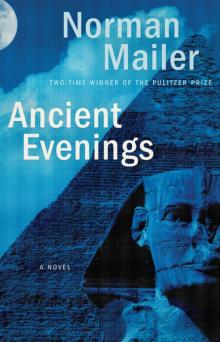 Ancient Evenings
Ancient Evenings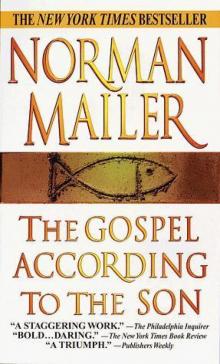 The Gospel According to the Son
The Gospel According to the Son Oswald's Tale: An American Mystery
Oswald's Tale: An American Mystery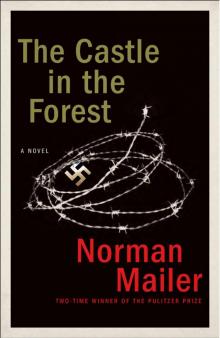 The Castle in the Forest
The Castle in the Forest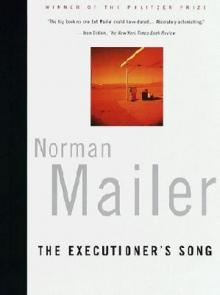 The Executioner's Song
The Executioner's Song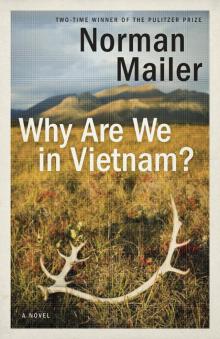 Why Are We in Vietnam?
Why Are We in Vietnam?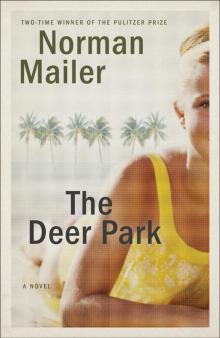 The Deer Park: A Play
The Deer Park: A Play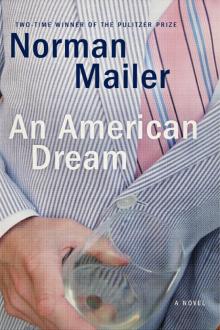 An American Dream
An American Dream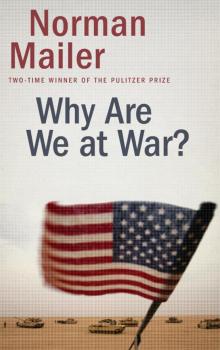 Why Are We at War?
Why Are We at War?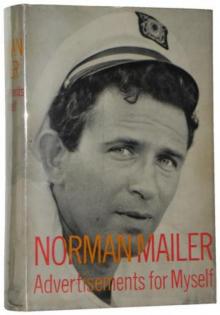 The Time of Her Time
The Time of Her Time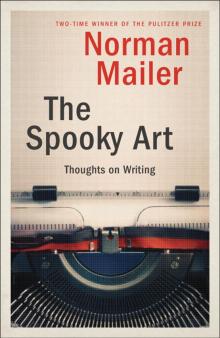 The Spooky Art: Thoughts on Writing
The Spooky Art: Thoughts on Writing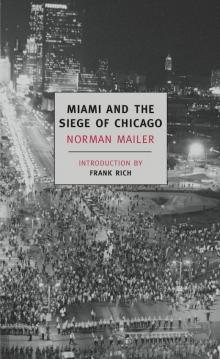 Miami and the Siege of Chicago
Miami and the Siege of Chicago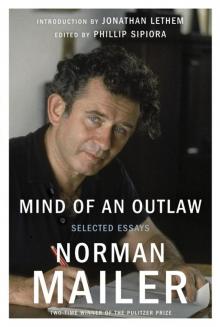 Mind of an Outlaw: Selected Essays
Mind of an Outlaw: Selected Essays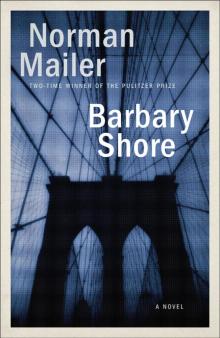 Barbary Shore
Barbary Shore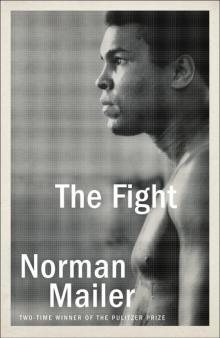 The Fight
The Fight Harlot's Ghost
Harlot's Ghost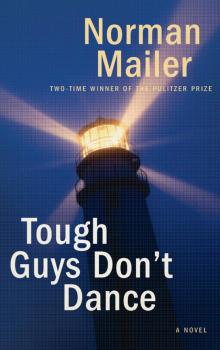 Tough Guys Don't Dance
Tough Guys Don't Dance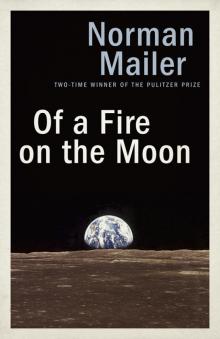 Of a Fire on the Moon
Of a Fire on the Moon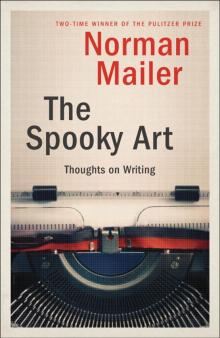 The Spooky Art
The Spooky Art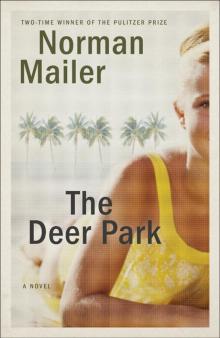 The Deer Park
The Deer Park On God: An Uncommon Conversation
On God: An Uncommon Conversation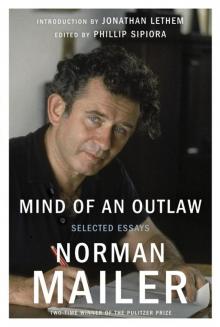 Mind of an Outlaw
Mind of an Outlaw Oswald's Tale
Oswald's Tale